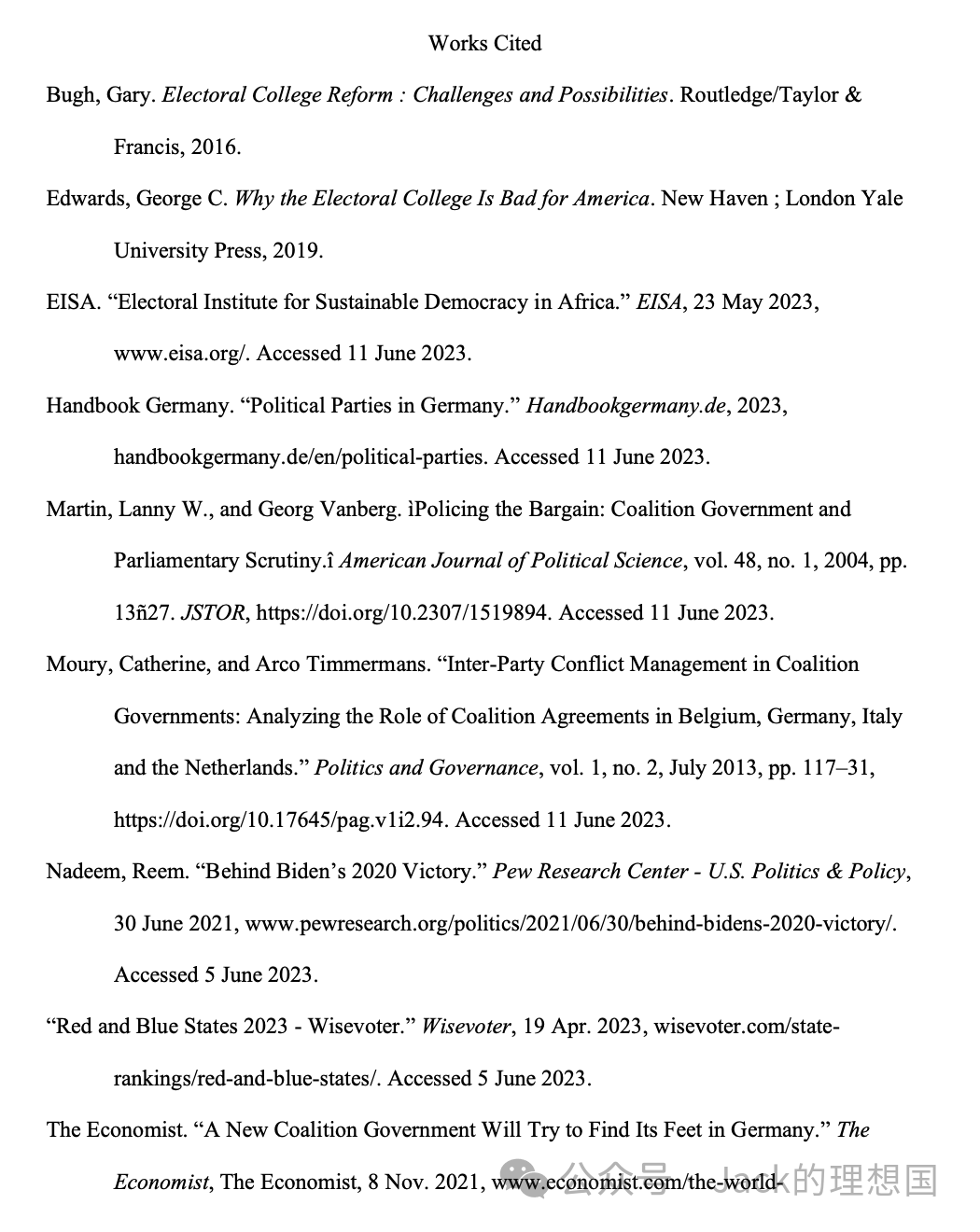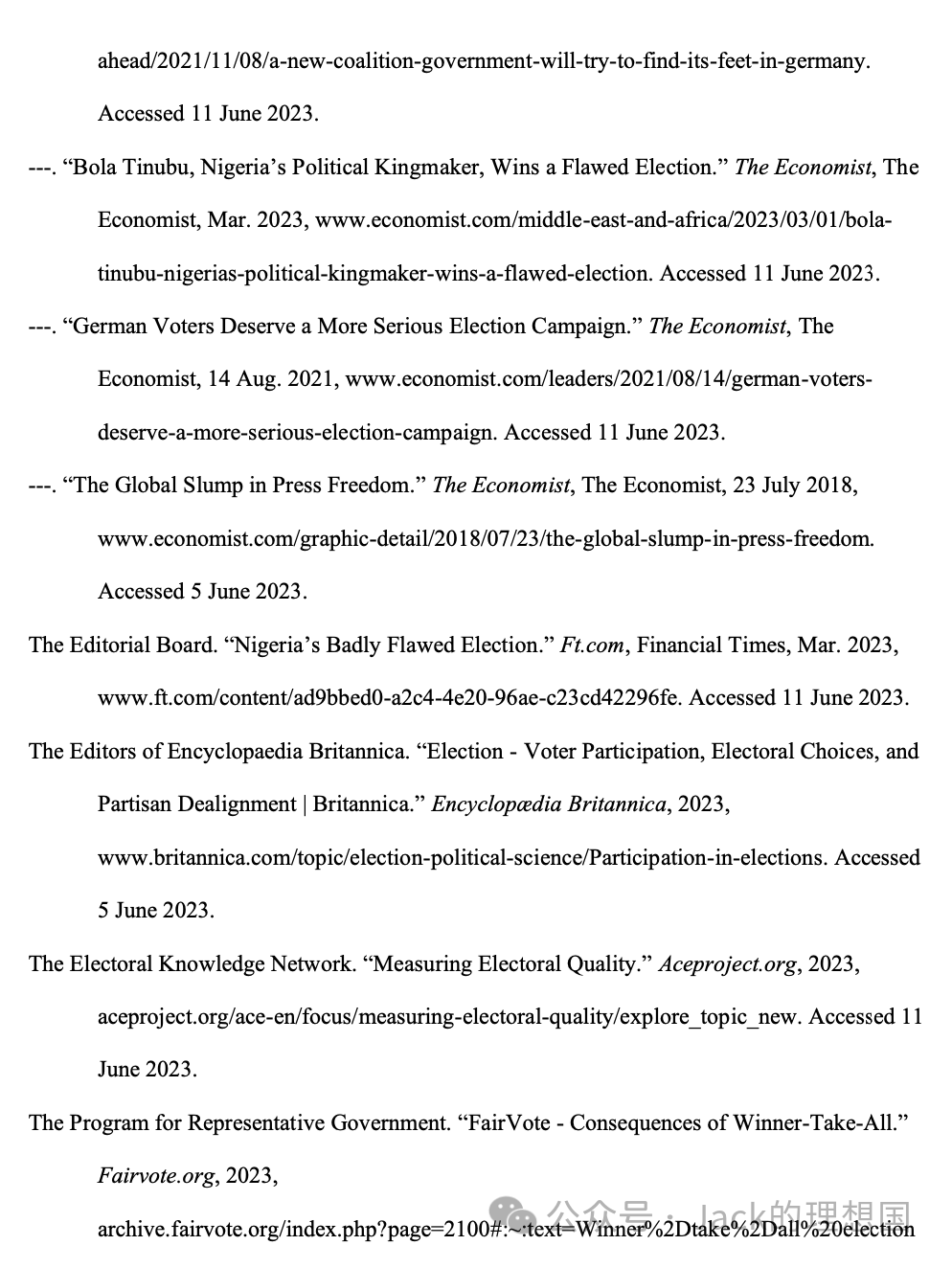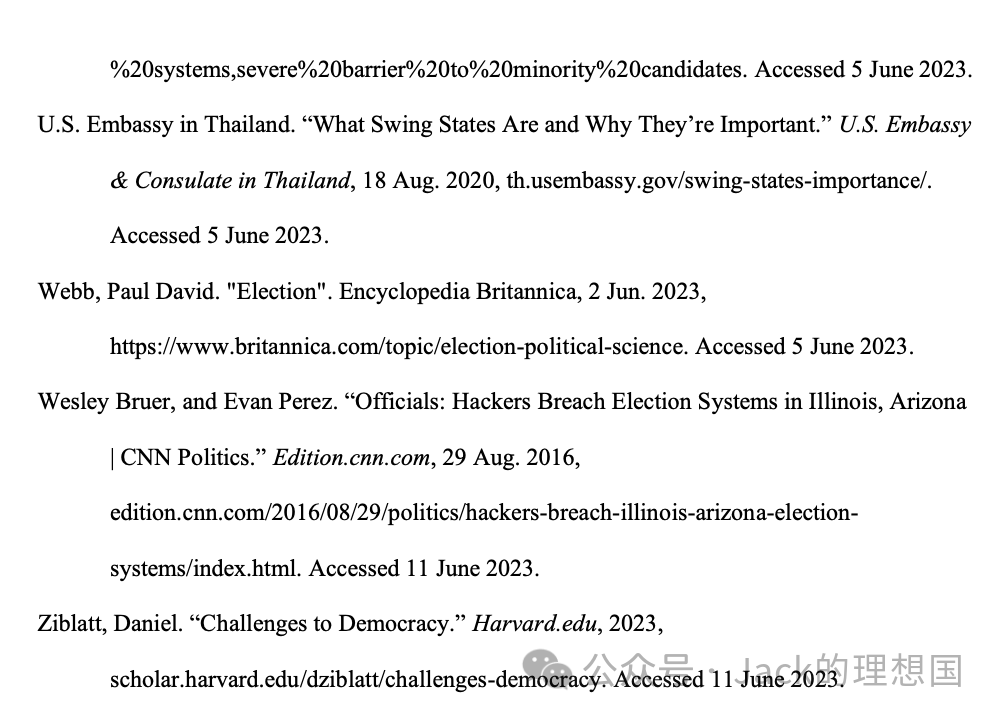On the Effectiveness of Elections 论选举的有效性
Introduction
From the first democratic elections in ancient Athens 2,500 years ago, votes to determine leaders is a system that has been fraught with complications. Since then, the world has grown only more complex. Interest groups, acrimonious bipartisanship, foreign interference, and electronic tampering are only a few examples of how elections are being affected. An election can only be said to deliver the will of the people when it properly reflects the views of the various social groups of the electorate. By completing case studies of the structural flaws within both a winner-takes-all and proportional representation system, as well as an investigation into the possibility of external manipulation of such elections, this essay will argue that elections do not express the will of the people effectively.
The Structural Flaws of Elections in a Winner-Takes-All System
One can start with a case study of the U.S., the most notable example of the winner-takes-all election system. An important aspect of it is the Electoral College, the body responsible for electing the President. Unfortunately, this body encourages politicians to campaign more in swing states and markedly less in other states. A swing state is near enough to the 50/50 mark in terms of which party is leading in the polls that targeted campaigning can have a material effect on elections. These states are more determinative to the outcome of elections than the “safe states” of either party, meaning that politicians are unlikely to campaign significantly in them. For instance, it does not make sense for a Republican candidate to campaign in solidly Democratic states, like New York, or for a Democrat to campaign in Alabama. Consequently, some citizens receive less opportunities to obtain a genuine impression of the candidate, especially compared to those who live in swing states. Additionally, voters can feel discouraged to vote in pre-determined outcomes states or districts, thus further distorting the popular vote.
A greater issue with the electoral college only becomes truly apparent when the entire nation is considered. An appropriate way to illustrate this issue would be to look at the 2020 General Election. While Mr. Biden won by around seven million votes in the popular vote, one need only move around 150,000 votes in key swing states, namely Georgia, Arizona, Nevada, Pennsylvania, and Wisconsin, to give the electoral college victory to Mr. Trump. In this example, Mr. Trump would then have won the election while trailing Mr. Biden by nearly seven million votes. Therefore, he would lack a democratic mandate by a large margin, and once again, it would be tough to argue that his reassumption of the highest office in the land reflected the will of the voters.
Aside from the electoral college, most states have a “winner-takes-all” system that givesthe congressional seat to the candidate who wins the majority in a particular district. But consider this hypothetical case: Florida has 30 electors. If the Republican candidates there won every district by a small margin of the total vote, then although Florida is almost 45 percent Democrat, not a single seat would be awarded to a Democrat. Therefore, the 55 percent Republican voters would enjoy 100% of the representation. Could this be said to accurately reflect Florida’s makeup?
Due to the winner-takes-all system, minor parties also face an unfair disadvantage. In the past several elections, the Libertarian Party did not win a single House seat, despite having millions of votes. Other parties, such as the Working Families Party, suffered similar fates. This implies that it would be extremely difficult for the will of the supporters of these parties to ever be heard in the government, as there would be no representative to speak for them. In the winner-takes-all system, the Democrats and Republicans have absolute power to dictate legislation and can maintain an iron grip on government. These two parties have no desire to level the playing field either, since power is never willingly shared.
Finally, one essential element for protecting the integrity of elections is the Fourth Estate, or the free press, which should provide facts and balanced perspectives on candidates to allow citizens to cast an informed vote. However, in America, the major news networks are increasingly polarized and have become “mouthpieces” for the parties. Fox News, for example, has been blamed for being a mouthpiece for the Republicans, persuading around four out of ten Americans to distrust it entirely. In a recent lawsuit brought against Fox by Dominion Voting Systems, it has been shown that "some network hosts and executives endorsed lies about Trump’s election loss, hosted conspiracy theorists who they thought were unhinged, and overtly prioritized the company’s profit over truth." Without a free and objective press, the public can easily be swayed or disinformed about candidates and elections, inhibiting informed elections.
The Structural Flaws of Elections in a Proportional Representation System
Contrary to the U.S., a prime example of a proportional representation election system is Germany. The central political body in the German system is the national parliament known as the "Bundestag." Germans elect the members of the Bundestag with two votes. The first is for a “direct candidate” in an electoral district, while the second is for a favorable party. The Bundestag’s seats are comprised of the representatives voted in from the first vote and a party proportional representation based on the second vote. Germany has five main parties: The Social Democratic Party (“SPD”), the Christian Democratic Union of Germany (“CDU”), the Christian Social Union in Bavaria (“CSU”), the Greens, and the Free Democratic Party (“FDP”). A recent alarming newcomer is the Alternative for Germany Party (“AfD”) which represents concerning nationalist and anti-immigrant views. It gained 11% representation in the most recent election.
In this representative structure, it is common to see coalition governments form, such asthe current “traffic light coalition” (SPD, FDP, and Greens) under the head of Olaf Scholz. However, coalitions have their share of problems as well. One way that coalitions render elections less effective is that smaller parties can get sidelined or stifled by existing coalitions. For example, the Left Party has consistently been targeted by coalitions due to its more radical left-wing policies. As a result, its supporters go almost unheard in the government. Elections within a representation system, while having some advantages over the winner-takes-all system, often end up with the same pitfall: only those parties that are viewed as cooperative or capable of compromise by the largest parties will be able to form coalitions. If you, as the voter, prefer one of these historically marginalized political parties, your voice will remain unheard.
Furthermore, the German system often causes confusion by the rallying of different political parties. The average German voter would be hard pressed to inform themselves on the agendas of every major candidate. As The Economist commented on Germany’s 2021 election, "the campaign has been dispiritingly superficial, avoiding serious policy debate and focusinginstead on the peccadillos and gaffes of party leaders...German citizens are not being given a clear choice of direction." Uninformed or bamboozled voters voting, in effect, goes against the true purpose of having elections, which is to reflect the well-considered vote of the election base.
The Possibility of External Manipulation in General
Aside from structural flaws, elections can be negatively affected by external manipulations, distorting an accurate representation of the will of the people. These external manipulations may include a foreign or domestic power or group affecting the results of the election.
The risks relating to election legitimacy are especially highlighted in developing countries. In Nigeria, Bola Tinubu “w[on] a flawed election”, according to numerous reliablesources. Mr. Tinubu won 37 percent of the vote, placing him well ahead of his opponents Atiku Abubakar (29 percent) and Peter Obi (25 percent). However, these numbers raised immediate doubt in Nigerians, and commentators abroad, as most predictions had suggested that Mr. Obi would win the popular vote. Later investigations confirmed the manipulation of the process and results. Some polling stations were attacked by armed men who intimidated voters to vote for Mr. Tinubu. Several seizures of ballot boxes and the burning of ballot papers occurred. The eventual counting was haphazard, as many of the results were uploaded illegitimately and incorrectly, invalidating large portions of the vote. Nigeria showcases the danger of external manipulation, as the people’s will mightbe twisted or ignored completely.
Even a more robust election system like the US has not been immune to external manipulation. In the 2016 elections, the heads of the FBI and the NSA voiced significant concern on the possibility of external attempts to hack the elections, such as Russian interference. Reports published in September 2016 corroborated that hacking attempts did happen, including one incident that tried to steal roughly 200,000 voting records in Illinois. These data hacks were seriously hazardous to electoral integrity, as many of these attempts aimed to influence political debates or “tweak” results directly. If successful, such attacks would render elections ineffective in expressing the genuine decisions of citizens.
The Convincingness of Recent Positive Trends
In the U.S., the latest 2020 presidential election witnessed the highest voter turnout rate in its history, signifying that more Americans sought to cast their ballot than ever before. However, as the Electoral Knowledge Network, an authoritative organization that examines the quality of elections, notes, "measuring electoral quality is like chasing moving target...The tools and methodologies used for measuring...are many and diverse." Other factors besides turnout rate, such as the representation of different social groups or the possibility of external manipulation, must be considered when analyzing the effectiveness of elections. By these crucial metrics, democracies, especially in the developing world, are suffering from an array of significant issues.
Even if one only examines only voter turnout rate, the trend is worrying on a global scale. In Africa, in particular, the voter turnout rate has been decreasing for many recently-established democracies, which can be partially attributed to their poor economic and unstable political statuses. Aside from Nigeria, one database of the Electoral Institute for Sustainable Democracy in Africa shows that the turnout rates in Angola, Botswana, and the Democratic Republic of the Congo are declining. These worrying trends illustrate that election systems are getting more incapable of capturing the will of the people globally.
Conclusion
Overall, the structural flaws in a winner-takes-all and proportional representation system and the growing possibility of external manipulation, point to the notion that elections increasingly do not express the will of the people. Not only do these two points have more merit,but the popular argument for the ability of elections to express the people’s will (i.e., that voter turnout rate is still high) is lacking merit.
While elections are growing more ineffective, this essayist would not argue for their abolishment. After all, elections are the keystones of any democratic system. At its core, the idea of an election allows the freedom of expression and association to blossom. However, in a more complex and volatile modern context, elections must adapt and evolve to effectively serve their purpose. Regulations must keep up with the rapid spread of social media, which provides new options for politicians to manipulate and solicit votes in illicit manners. Improved education must continue to edify the citizenry, equipping them with the ability to make well- considered decisions. An election can only be effective when the larger democracy it belongs to is efficient and robust.



导言
从 2500 年前古雅典的第一次民主选举开始,投票决定领导人的制度就充满了复杂性。之后,世界只变得更加复杂。利益集团、尖锐的党争、外国干涉和电子篡改只是能影响选举受到的几个因素。只有当选举正确反映了选民中不同社会群体的观点时,才能说选举体现了人民的意愿。通过对 "赢者通吃 "和比例代表制的结构性缺陷进行案例研究,以及对选举本身受到外部操纵的可能性进行调查,本文将论证选举并不能有效表达人民的意愿。
“赢家通吃”选举的结构缺陷
我们可以从美国的案例研究开始,美国是赢家通吃选举制度最显著的例子。它的一个重要方面是选举团,即负责选举总统的机构。遗憾的是,该机构更鼓励政治家在摇摆州开展竞选活动,使其他的州得到一定程度上的忽视。摇摆州意味着两党势均力敌,均有可能获得选票上的领先,因此有针对性的竞选活动会对选举产生重大影响。与任何一方的 "安全州 "相比,这些州对选举结果的决定性更大,这意味着政治家不太可能在这些“安全州”大张旗鼓地开展竞选活动。例如,共和党候选人在纽约等民主党稳固的州开展竞选活动是不合理的。同样,民主党人在阿拉巴马州竞选也是不合理的。因此,与那些生活在摇摆州的人相比,一些公民获得对候选人真正印象的机会更少。此外,选民可能不会在预先确定结果的州或选区进行积极投票,从而进一步扭曲了普选结果。
只有从整个国家的角度来考虑,选举团的更大问题才会真正显现出来。2020 年大选是说明这一问题的恰当方式。虽然拜登在普选中赢得了约 700 万张选票,但只需在关键的摇摆州,即佐治亚州、亚利桑那州、内华达州、宾夕法尼亚州和威斯康星州调动约 15 万张选票,选举团的胜利就会归于特朗普。在这个例子中,特朗普将在落后拜登先近 700 万票的情况下赢得选举。因此,虽然他在机制中获得胜利,但他实际缺乏人民民主的授权,很难说他重新获得美国政治的最高职位反映了选民的意愿。
除选举团外,大多数州政府都实行 "赢家通吃 "制度,将国会席位给予在特定选区赢得多数票的候选人。但考虑一下这个假设情况: 佛罗里达州有 30 名选举人。如果佛罗里达州的共和党候选人以微弱优势赢得每个选区的总选票,那么尽管佛罗里达州的民主党支持者比例接近 45%,但没有一个席位将授予民主党政客。因此,55% 的支持共和党选民将享有 100%的代表。这可以说是准确反映了佛罗里达州的政治意见构成吗?
由于实行赢者通吃制度,小党派也面临着不公平的劣势。在过去的几次选举中,自由党尽管拥有数百万选票,却没有赢得一个众议院席位。其他政党,如工作家庭党,也遭遇了类似的命运。这意味着,这些政党的支持者的意愿很难在政府中得到体现,因为没有代表为他们发声。在 "赢家通吃 "的制度下,民主党和共和党拥有支配立法的绝对权力,可以牢牢控制政府。这两个党派也无意创造公平的竞争环境,因为权力从来不是自愿分享的。
最后,保护选举公正性的一个基本要素是新闻自由,它应提供有关候选人的事实与平衡的观点,以便公民在知情的情况下投票。然而,在美国,主要的新闻网络日益两极分化,成为政党的 "喉舌"。例如,福克斯新闻就被指责为共和党的喉舌,导致约十分之四的美国人完全不信任它。Dominion 投票系统公司最近对福克斯提起的诉讼显示,"一些网络主持人和高管认可关于特朗普竞选失利的谎言,接待他们认为精神错乱的阴谋论者,并公然将公司的利润置于真相之上"。没有自由客观的新闻媒体,公众很容易被左右,或对候选人和选举失去了解,从而阻碍知情选举。
比例代表制选举的结构性缺陷
与美国相反,德国是比例代表选举制的典型代表。德国选举制度的核心政治机构是被称为 "联邦议院"(德国手册)的国家议会。德国人通过两票选举联邦议院议员。第一张选票投给一个选区的 "直接候选人",第二张选票投给一个有利的政党。联邦议院的议席由选区内投票选出的代表组成。德国有五个主要政党: 社会民主党("社民党")、德国基督教民主联盟("基民盟")、巴伐利亚基督教社会联盟("基社盟")、绿党和自由民主党("自民党")。最近新加入的德国新选择党("AfD")令人担忧,它代表了民族主义与反移民的观点。该党在最近一次选举中获得了 11% 的代表权。
在这种代议制结构中,联合政府的形成很常见,例如目前由奥拉夫-肖尔茨领导的 "红绿灯联盟"(社民党、自民党与绿党)。然而,联合政府也有其自身的问题。联合导致选举效率降低的一个原因是,小党派可能会被现有的联合政府排挤或扼杀。例如,左翼党因其激进的左翼政策而一直是联合政府的目标。因此,其支持者在政府中几乎无人问津。与赢家通吃制相比,代表制选举虽然有一些优势,但往往也有同样的缺陷:只有那些被最大政党视为合作或能够妥协的政党才能组成联盟。如果选民偏爱这些历史上被边缘化的政党中的一个,他们的声音仍将被忽视。
此外,德国的制度经常因不同政党的联合而造成混乱。普通德国选民很难了解每个主要候选人的议程。正如《经济学人》对德国 2021 年大选的评论,"竞选活动肤浅得令人沮丧,避免了严肃的政策辩论,而是将重点放在政党领导人的小毛病和口误上......德国公民没有得到明确的方向选择"。实际上,不知情或被蒙蔽的选民在投票违背了选举的真正目的,即反映选举基础的深思熟虑的投票。
外部操纵的可能性
除结构性缺陷外,外部操纵也会对选举产生负面影响,扭曲人民意愿的准确体现。这些外部操纵可能包括外国或国内势力或团体影响选举结果。
与选举合法性有关的风险在发展中国家尤为突出。在尼日利亚,据许多可靠消息来源称,博拉-蒂努布 "参加了一次有缺陷的选举"。蒂努布赢得了 37% 的选票,遥遥领先于对手阿提库-阿布巴卡尔(29%)和彼得-奥比(25%)。然而,这些数字立即引起了尼日利亚人与国外评论家的质疑,因为大多数预测都认为奥比先生将赢得普选。后来的调查证实了对投票过程及其结果的操纵。一些投票站遭到武装人员袭击,他们恐吓选民投票给蒂努布先生。多处地方发生了数起没收投票箱和焚烧选票的事件。最终的计票工作杂乱无章,因为许多结果都是非法或错误上传的,导致大部分选票无效。尼日利亚展示了外部操纵的危险,因为人民的意愿可能被扭曲或完全忽视。
即使像美国这样较为健全的选举制度也难免受到外部操纵。在 2016 年的大选中,联邦调查局与国家安全局的负责人对外部黑客企图干预选举的可能性表示了极大的担忧,比如俄罗斯的干预。2016 年 9 月期间发表的报告证实,黑客攻击企图确实发生过,包括一次试图窃取伊利诺伊州约 20 万条投票记录的事件。这些数据黑客行为严重危害了选举的公正性,因为其中许多企图旨在影响政治辩论或直接 "调整 "选举结果。如果这些攻击得逞,选举将无法有效表达公民的真实决定。
近期积极趋势的说服力
在美国,最近一次 2020 年总统大选的投票率创下历史最高纪录,这表明寻求投票的美国人比以往任何时候都多。然而,正如研究选举质量的权威组织 "选举知识网络"(Electoral Knowledge Network)所指出的,"衡量选举质量就像追逐移动的目标......用于衡量的工具和方法......多种多样"。在分析选举的有效性时,除了投票率,还必须考虑其他因素,如不同社会群体的代表性或外部操纵的可能性。从这些关键指标来看,民主国家,尤其是发展中世界的民主国家,正在遭受一系列重大问题的困扰。
即使只考察投票率,全球范围内的趋势也令人担忧。特别是在非洲,许多新近建立的民主国家的投票率一直在下降,部分原因可能是这些国家的经济状况不佳,政治不稳定。除尼日利亚外,非洲可持续民主选举研究所的一个数据库显示,安哥拉、博茨瓦纳与刚果民主共和国的投票率也在下降(EISA)。这些令人担忧的趋势表明,在全球范围内,选举制度越来越无法体现人民的意愿。
结论
总之,赢家通吃与比例代表制的结构性缺陷以及外部操纵的可能性越来越大,表明选举越来越不能表达人民的意愿。这两点不仅更有说服力,而且选举能够表达人民意愿的流行论点(即投票率仍然很高)也缺乏说服力。
虽然选举的效果越来越差,但作者不会主张废除选举。毕竟,选举是任何民主制度的基石。选举的核心理念是让言论和结社自由得以绽放。然而,在更加复杂多变的现代环境中,选举必须不断适应与发展,才能有效实现其目的。法规必须跟上社交媒体的快速传播,社交媒体为政客以非法方式操纵并拉选票提供了新的选择。国家必须继续加强对公民的教育,使他们具备深思熟虑后做出决定的能力。只有当选举所隶属的更大范围的民主制度是高效与健全的时候,选举才会真正有效。
- 本文标签: 原创
- 本文链接: http://www.jack-utopia.cn//article/628
- 版权声明: 本文由Jack原创发布,转载请遵循《署名-非商业性使用-相同方式共享 4.0 国际 (CC BY-NC-SA 4.0)》许可协议授权










